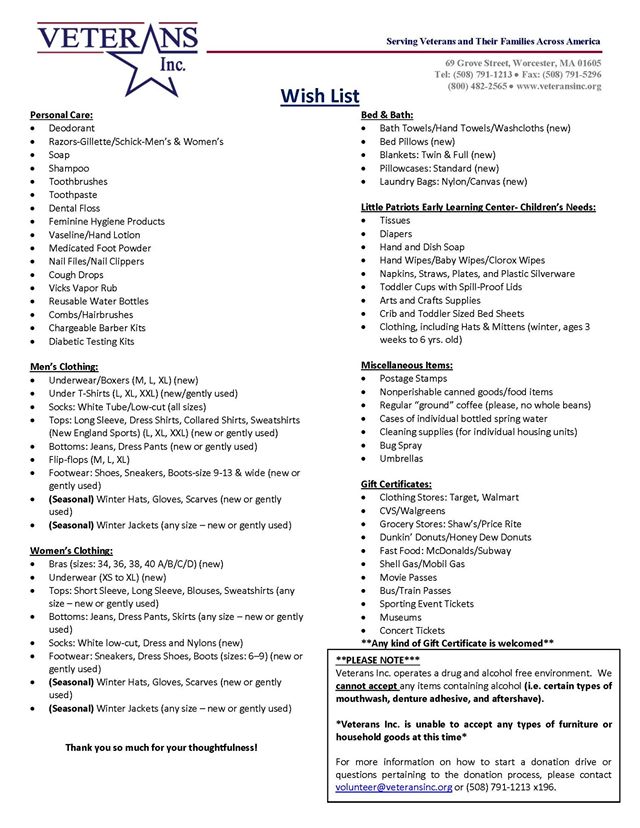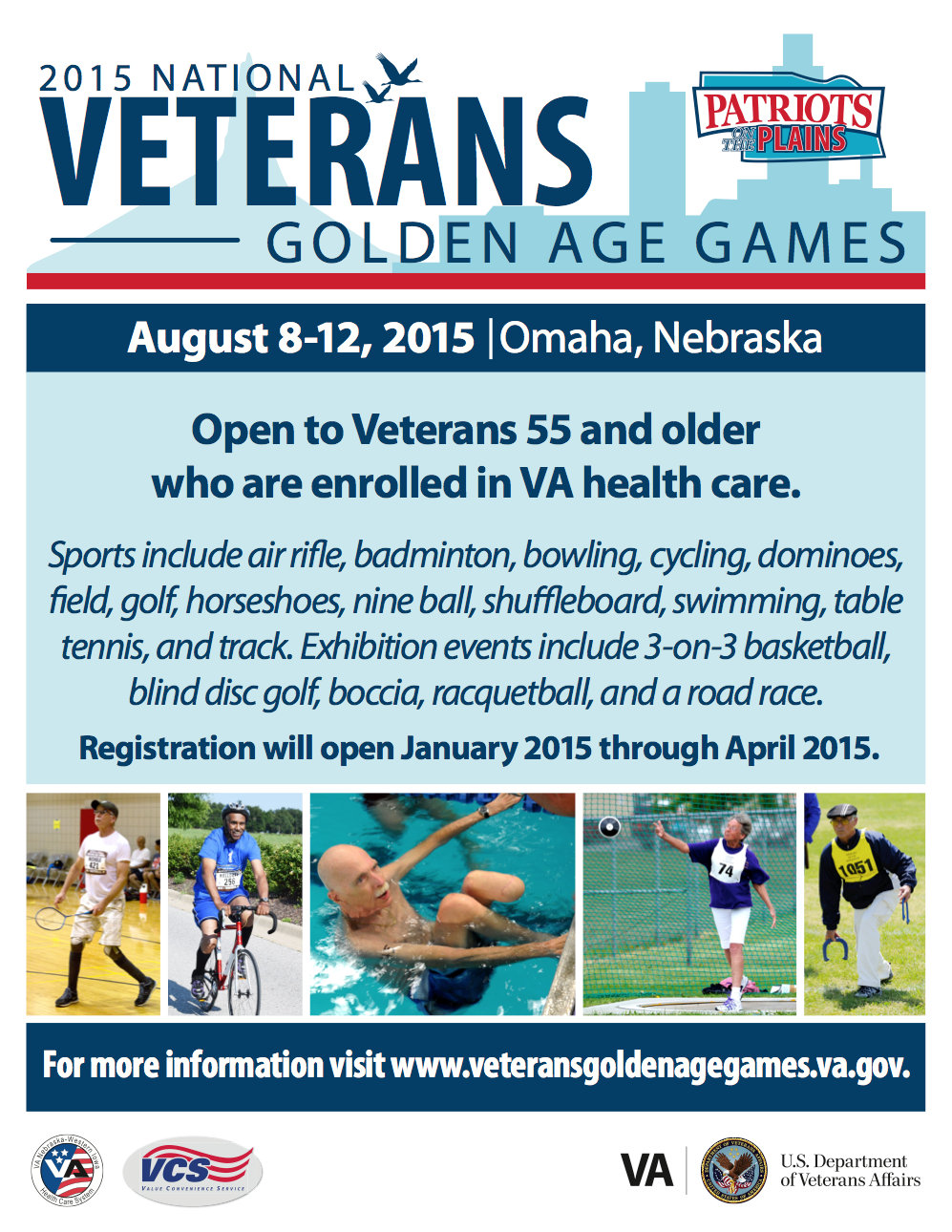
Author Archives: admin
2015 National Veterans Golden Age Games

Be Prepared For Natural Disasters
Natural disasters can take place at any moment and can come in any form from floods, severe weather, earthquakes and more, yielding unfortunate outcomes without warning. Being prepared can save lives and planning is important; know who will help you if you need assistance or if you need to evacuate.
Be Informed
Ensure you have the proper equipment to stay up-to-the-minute on breaking news and changing weather patterns. You may need a radio for this, specifically one that runs on batteries so be sure you have extras. Know when, where and what local branches of organizations like American Red Cross, have planned in your specific location, and find out how they can help. Also, ensure you can maintain contact with those outside of your home, having a phone car charger and jumper cables could be essential.
Make a Plan
For people with mobility challenges, assistance can be crucial.
If are a caregiver, or if you have assembled a “Help Team” to assist a person in need:
- Be helpful in letting others know exactly what you need and when you need it.
- Contact family, friends, neighbors or social service agencies if and when possible.
- Try to have someone available who can lift and carry heavy objects such as wheelchairs or other medical equipment.
- Give at least one other person a key to the person’s home.
- Each team member should have the contact information for the others.
- Name a substitute caregiver in case the original is unavailable.
Develop an evacuation strategy with your “Disaster Team,” and consider the following:
- Where are the closest special needs emergency shelters and what are the different routes you can take to reach them?
- What supplies must you take with you that are used every day?
- Whom should you inform that you are evacuating?
- How much gas do you have and how much will much will you need? Be sure to keep your vehicle’s gas tank over 1/2 full at all times.
Make a Kit
Assemble your kit well in advance with the help of a list and be sure to include:
- Water – Keep one gallon of water per person (and per pet) per day for at least three days. Make sure you replace the water every six months.
- Food – Keep at least a 3-day stock of non-perishable food that requires little cooking and no refrigeration in a safe place. Include a manual can opener and eating utensils.
For those with mobility disAbilities:
- Pair of heavy gloves to use while wheeling or making your way over glass and debris
- Extra battery for your motorized wheelchair or scooter
- Jumper cables or specific recharging device to be connected to an automobile’s cigarette lighter
- Patch kit or can of “seal-in-air product” to repair flat tires
- Spare cane or walker
- Food, medicine, favorite toy, and other care items for your service animal
- Plastic bags, disposable gloves, and other items for the animal’s care
Find out if you qualify for assistance and fill out a form in advance to ensure your safety should the need arise. And be aware of FEMA resources in your area, including their capabilities and the best way to reach them.
#22KILL: Battle Buddy
Become a Veterans’ Advocate and “Battle Buddy”
You do not have to be a trained professional to help someone in need. You don’t have to be a veteran to empathize with their situation. People in a crisis sometimes just need someone to talk to because they feel alone and unheard by those who are closest to them. They may feel too ashamed to call out for help from their friends and family and can benefit from speaking to an anonymous individual. By not feeling judged, they can feel more comfortable about opening up and and talking about their situation.
Criteria:
- Have a genuine love and respect for veterans and all active military members. You do not have to be a veteran.
- Have a cell phone, and be willing to take calls/texts at any time from a veteran wanting to talk
Roles/Responsibilities:
As a Battle Buddy, you will have a profile listed on www.22kill.com’s public directory, and veterans in crisis will be able to find you and call you if they want to talk. Your commitment is to simply be someone who cares and to listen if a veteran ever calls. That’s it. Don’t judge; don’t push. Just having someone to talk to who genuinely cares and will listen can make a substantial difference. If you do feel there is a crisis, you can call 911 or have someone else call.
If you are not comfortable with being a Battle Buddy there are other ways you can help as a Veterans’ Advocate. We encourage you to join Team #22KILL in connecting and growing the veteran support system. Become a volunteer for their events and community projects, and share their page with your network of friends, family, and every veteran you know.
Sign up and become a Battle Buddy today!
Please Visit www.22kill.com for more information
Winter Vehicle Safety Checklist
With the winter months here, it’s important to make sure your adaptive vehicle is in good shape to maximize protection and prevent breakdowns brought on by cold weather conditions. Here are some key items we recommend having checked on your wheelchair accessible vehicle to keep it running at its best and avoid the inconvenience of being stranded outside and emergency repairs.
Get Your Battery Tested
Cold weather can dramatically reduce the strength of your mobility vehicle’s battery. It’s important to have your battery tested to insure it’s fully charged. This is especially true if your battery is over two years old. And don’t forget to have your battery cables, posts and fasteners inspected. The cables should be in good shape and firmly connected to the battery.
Replace Your Wiper Blades
It’s recommended you replace your windshield wiper blades every six months. Ice and snow can be rough on the soft rubber, so we suggest replacing them with a heavier winter blade. Windshields get dirty quickly in the winter months from the sand, salt and spray off the road, so refill your washer fluid often for optimum visibility. Use a 50/50 mix of washer and water.
Check Your Tires
Make sure all of your tires including the spare are in good condition. Take a good look at the tread and consider replacing or rotating your tires if they are starting to wear out. Also check your tire pressure regularly. Cold weather causes tire pressure to drop and may result in the sensors indicating an unsafe driving pressure. Proper tire inflation makes for safer driving and better gas mileage.
Check Hoses, Clamps and Drive Belts
A belt or hose failure can cause serious engine, steering and electrical problems. Have your hoses checked for leaks or soft spots especially around the clamps. The thermal fluctuation between hot and cold can be even more severe in winter than summer months. Flush and refill your cooling system with a 50/50 mixture of antifreeze and water. It’s also a good idea to make sure the heater and defroster are in good working condition.
Make Sure Your Mobility System Is Operating
Your conversion equipment is exposed to the elements as you enter and exit your handicap accessible vehicle and winter weather can compound those effects. Make sure your lift or ramp are lubricated and adjusted properly. Check the doors, mechanisms and ramp assembly for corrosion and rust. Snow, salt, sand and ice can easily cause problems.
Something to remember no matter what time of year is that having your oil changed regularly is probably the most important thing you can do to extend the life of your vehicle and keep it running properly.
